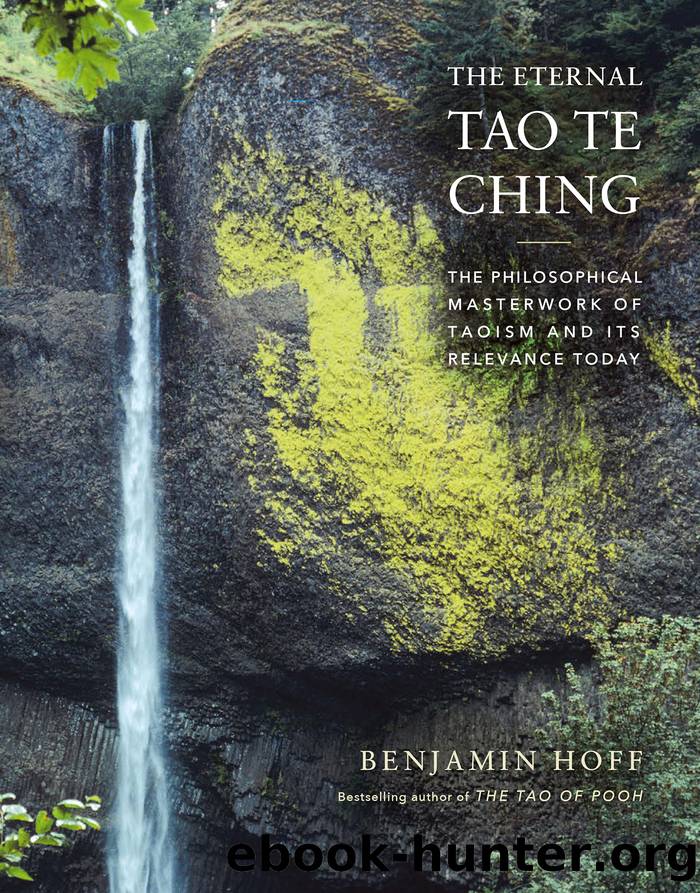The Eternal Tao Te Ching by Hoff Benjamin;

Author:Hoff, Benjamin;
Language: eng
Format: epub
Publisher: Abrams, Inc.
Published: 2022-01-04T00:00:00+00:00
32.
WITHOUT TITLES
Here and there in the Way Virtue Classic, especially in this chapter, the author seems to be advocating a form of democracy, the opposite of Confucianism, in harmony with the checks and balances of the natural world. Here he is criticizing the tendency of Chinaâs governmental systemsâin particular, it would appear, the one advocated by the Confucianistsâto complicate matters and make people unequal to each other.
The character ming, used three times in the chapterâs text, can mean not only âname,â as itâs commonly used; it can also mean âtitle,â âdesignation,â ârank,â âposition,â or âfame.â In this chapter, âtitle,â ârank,â and âpositionâ all seemed appropriate translations. So I used all three, starting with the second line of my first stanza.
In my first stanza, âactâ in the tenth line and âbehaveâ in the last line are my in-context interpretations of the textâs tzÅ, âI,â âself,â âmy,â âbehavior,â âto act.â TzÅ is typically interpreted indiscriminately in English-language versions of this and other chapters (such as Chapter Thirty-Seven) as âself.â
Chih in the text of my second and third stanzas means âregulation,â âa rule,â or âa system.â I used all three definitions to emphasize the point that the author seems to be making.
Regarding âprincesâ (first stanza, seventh line): According to one authority, in the time of the feudal kings (which included the Warring States period) hou would have meant âprince,â while later it would have meant âdukeâ or âmarquis.â That would explain why some versions of this and other chapters present hou as âprince,â while other versions (most that Iâve seen) present it as âdukeâ or âmarquis.â
The Chinese text of my first stanzaâs lines seven and eight is hou wang jo nêng shou chih, âPrinces kings if able to guard/to protect/to keep it.â Other interpreters of this chapter, Chapter Thirty-Seven, and Chapter Fifty-Two render shou, âguard,â âprotect,â or âkeep,â as âkeepâ or âhold,â or interpret it in words not related to shou, such as âkeep to,â âcling to,â âmaintain,â and so on. But with âkeepâ as the chosen meaning, the author would seem to be saying in the text of my lines seven through fourteen that âIf princes and kings were able to keep it [capture it, lock it up, and keep it for themselves], the ten thousand things would act as their guests. Heaven and earth would notice, and would unite to send sweet dew. The people, without being ordered to do so, would then behave as equals.â
It seems more likely that in such a case the ten thousand things would die, heaven and earth would disintegrate, and the peopleâpretending for the sake of argument that they somehow would surviveâwould continue in their feudal positions of inequality under the rule of the now-stupendously powerful princes and kings. That is one reason why I chose âguardâ and âprotectâ as the in-context appropriate definitions of shou. But I give a better reason next.
Apparently to other interpreters, shou as âguardâ or âprotectâ would make no sense. A spirit, most people in Western culture would probably say,
Download
This site does not store any files on its server. We only index and link to content provided by other sites. Please contact the content providers to delete copyright contents if any and email us, we'll remove relevant links or contents immediately.
| Confucianism | Feng Shui |
| I Ching | Jainism |
| Karma | Shintoism |
| Sikhism | Tao Te Ching |
| Taoism | Tibetan Book of the Dead |
| Zoroastrianism |
The Tao of Physics by Fritjof Capra(2168)
The Diamond Cutter by Geshe Michael Roach(1957)
Human Design by Chetan Parkyn(1859)
Feng Shui by Stephen Skinner(1859)
The Alchemy of Sexual Energy by Mantak Chia(1779)
Tao Te Ching by Lao Tzu(1756)
365 Tao: Daily Meditations by Ming-Dao Deng(1541)
Tao Tantric Arts for Women by Minke de Vos(1510)
Sun Tzu's The Art of War by Giles Lionel Minford John Tzu Sun(1476)
Karma-Yoga and Bhakti-Yoga by Swami Vivekananda(1437)
Buddhism 101 by Arnie Kozak(1429)
Sidney Sheldon (1982) Master Of The Game by Sidney Sheldon(1424)
The Analects of Confucius by Burton Watson(1356)
The Art of War Other Classics of Eastern Philosophy by Sun Tzu Lao-Tzu Confucius Mencius(1349)
The Way of Chuang Tzu by Thomas Merton(1292)
Tao te ching by Lao Tzu(1292)
The New Bohemians Handbook by Justina Blakeney(1287)
The Sayings Of by Confucius(1249)
Bless This House by Donna Henes(1195)
